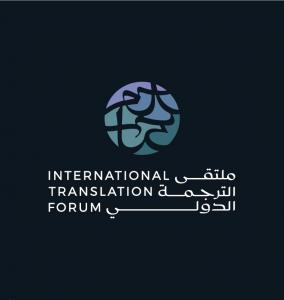International Translation Forum 2025 Highlights the Role of Medical Translation in Healthcare Facilities
RIYADH, SAUDI ARABIA, November 13, 2025 /EINPresswire.com/ -- Within the framework of the International Translation Forum 2025, organized by the Literature, Publishing and Translation Commission under the theme “Saudi Arabia Translates the Future”, a panel discussion titled “The Language of Life: Medical Translation in Healthcare Facilities” examined best practices in the field of medical translation. The session shed light on the pivotal role of translators in enhancing the quality of healthcare services and fostering effective communication between patients and healthcare providers.
The session was moderated by Dr. Khalifa Alhazaa from Qatar University, with the participation of Mrs. Roksan Lashin from the National Accreditation Authority for Translators and Interpreters (NAATI) in Australia, Mrs. Francesca Matteodo, a specialized medical translator, and Mrs. Reem Alfarrash, a certified medical translator.
Speakers discussed the current state of medical translation in healthcare institutions, emphasizing that medical translators are a vital part of the healthcare system. They ensure accurate communication between doctors and patients and convey medical information with precision to safeguard patient safety and enhance the effectiveness of diagnosis and treatment.
The panelists further noted that medical translation goes beyond linguistic transfer—it serves as a humanitarian bridge that fosters trust and understanding between patients and medical teams. The translator, they explained, plays a central role in conveying emotions and nuanced meanings, ensuring that information is communicated in a culturally and humanely sensitive manner that positively impacts the quality of healthcare delivery.
The participants also emphasized the importance of developing specialized educational and training programs in universities and professional institutions to prepare translators capable of keeping pace with advancements in the healthcare sector and utilizing modern translation technologies in line with the digital transformation of medical services. They noted that the world is currently witnessing a rapid intellectual and industrial revolution driven by artificial intelligence, which makes it essential for translators to continually acquire new skills and upgrade their professional tools to stay aligned with this evolving landscape.
They further stressed that artificial intelligence cannot replace the human translator, who alone can convey precise meaning and understand the cultural and emotional context of texts—qualities machines inherently lack. AI, they added, can serve as a partner rather than a substitute when effectively harnessed to enhance accuracy and speed. The speakers called for the creation of training programs that enable translators to use AI tools consciously and responsibly, fostering professional practices that combine human expertise with technological innovation.
The International Translation Forum 2025, held at the King Fahd Cultural Center in Riyadh from November 6 to 8, reflects the efforts of the Literature, Publishing, and Translation Commission to reinforce the Kingdom’s role as a leading cultural and intellectual hub. The forum also seeks to advance the translation industry as a vital bridge for intercultural dialogue and a cornerstone in realizing Saudi Vision 2030, through the empowerment of national talent and the expansion of international partnerships in specialized areas of translation.
The session was moderated by Dr. Khalifa Alhazaa from Qatar University, with the participation of Mrs. Roksan Lashin from the National Accreditation Authority for Translators and Interpreters (NAATI) in Australia, Mrs. Francesca Matteodo, a specialized medical translator, and Mrs. Reem Alfarrash, a certified medical translator.
Speakers discussed the current state of medical translation in healthcare institutions, emphasizing that medical translators are a vital part of the healthcare system. They ensure accurate communication between doctors and patients and convey medical information with precision to safeguard patient safety and enhance the effectiveness of diagnosis and treatment.
The panelists further noted that medical translation goes beyond linguistic transfer—it serves as a humanitarian bridge that fosters trust and understanding between patients and medical teams. The translator, they explained, plays a central role in conveying emotions and nuanced meanings, ensuring that information is communicated in a culturally and humanely sensitive manner that positively impacts the quality of healthcare delivery.
The participants also emphasized the importance of developing specialized educational and training programs in universities and professional institutions to prepare translators capable of keeping pace with advancements in the healthcare sector and utilizing modern translation technologies in line with the digital transformation of medical services. They noted that the world is currently witnessing a rapid intellectual and industrial revolution driven by artificial intelligence, which makes it essential for translators to continually acquire new skills and upgrade their professional tools to stay aligned with this evolving landscape.
They further stressed that artificial intelligence cannot replace the human translator, who alone can convey precise meaning and understand the cultural and emotional context of texts—qualities machines inherently lack. AI, they added, can serve as a partner rather than a substitute when effectively harnessed to enhance accuracy and speed. The speakers called for the creation of training programs that enable translators to use AI tools consciously and responsibly, fostering professional practices that combine human expertise with technological innovation.
The International Translation Forum 2025, held at the King Fahd Cultural Center in Riyadh from November 6 to 8, reflects the efforts of the Literature, Publishing, and Translation Commission to reinforce the Kingdom’s role as a leading cultural and intellectual hub. The forum also seeks to advance the translation industry as a vital bridge for intercultural dialogue and a cornerstone in realizing Saudi Vision 2030, through the empowerment of national talent and the expansion of international partnerships in specialized areas of translation.
Osama Alsheikh
Benchmark
email us here
Legal Disclaimer:
EIN Presswire provides this news content "as is" without warranty of any kind. We do not accept any responsibility or liability for the accuracy, content, images, videos, licenses, completeness, legality, or reliability of the information contained in this article. If you have any complaints or copyright issues related to this article, kindly contact the author above.

